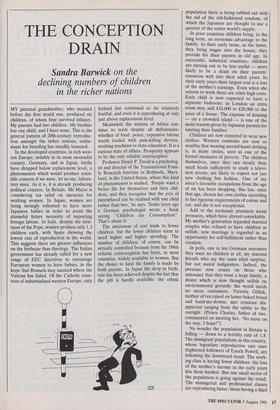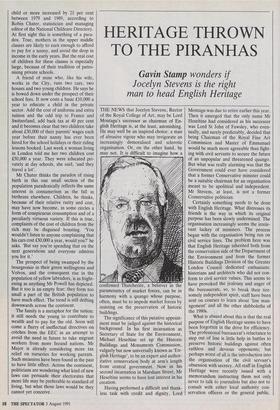THE CONCEPTION DRAIN
Sandra Barwick on the
declining numbers of children in the richer nations
MY paternal grandmother, who married before the first world war, produced six children, of whom four survived infancy. My parents had two children. My brother has one child, and I have none. This is the general pattern of 20th-century reproduc- tion amongst the richer nations; enthu- siasm for breeding has steadily lessened.
In the developed countries, in rich west- ern Europe, notably in its most successful country, Germany, and in Japan, births have dropped below replacement level, a phenomenon which would produce scien- tific concern if we were, let us say, labora- tory mice. As it is, it is already producing political concern. In Britain, Mr Major is considering tax relief on nurseries for working women. In Japan, women are being strongly exhorted to have more Japanese babies in order to avoid the shameful future necessity of importing foreign labour. In Italy, despite the stric- tures of the Pope, women produce only 1.3 children each, with Spain showing the lowest rate of reproduction in the world. This suggests there are greater influences on the birthrate than theology. The Italian government has already called for a new range of EEC directives to encourage European women to have babies, in the hope that Brussels may succeed where the Vatican has failed. Of the Catholic coun- tries of industrialised western Europe, only Ireland has continued to be relatively fruitful, and even it is reproducing at only just above replacement level. Meanwhile the nations of Africa con- tinue to teem despite all deficiencies; whether of food, peace, expensive labour wards loaded with pain-killing devices, washing machines or state education. It is a curious state of affairs. Prosperity appears to be the only reliable contraceptive.
Professor Henry P. David is a psycholog- ist and director of the Transnational Fami- ly Research Institute in Bethesda, Mary- land, in the United States, where this kind of phenomenon is studied. 'People want a better life for themselves and their chil- dren, and they recognise that the joys of parenthood can be realised with one child rather than two,' he says. 'Some years ago a German psychologist wrote a book saying "Children are Consumption". That's about it.'
The awareness of cost leads to fewer children, but the fewer children seem to need higher and higher spending. The number of children, of course, can be actually controlled because from the 1960s reliable contraception has been, in most countries, widely available to women. But the choice to limit the family is made by both parents. In Japan the drop in birth- rate has been achieved despite the fact that the pill is hardly available: the ethnic population there is being rubbed out with the aid of the old-fashioned condom, of which the Japanese are thought to use a quarter of the entire world's supply.
In poor countries children bring, in the long term, an economic advantage to the family. In their early teens, at the latest, they bring wages into the house; they provide for their parents in old age. In successful, industrial countries, children are turning out to be less useful — more likely to be a drain on their parents' resources well into their adult years. In their early years their largest cost is a loss of the mother's earnings. Even when she returns to work there are other high costs. Each child is now expected to have a separate bedroom; in London an extra room may add £10,000 to £20,000 to the price of a house. The expense of housing — on a crowded island — is one of the main reasons given by Japanese parents for limiting their families.
Children are now expected to wear new clothes: Western countries are now so wealthy that wearing second-hand clothing is, in many circles, seen as one of the formal measures of poverty. The children themselves, once they can steady their small heads sufficiently to study a televi- sion screen, are likely to expect not just new clothing but fashion. One of my niece's favourite occupations from the age of six has been shopping. She has, since that age, chosen her own clothes according to her rigorous requirements of colour and cut, and she is not exceptional.
Add to the economic pressures social pressures, which have altered remarkably. My mother's generation regarded married couples who refused to have children as selfish; now marriage is regarded as an opportunity for self-fulfilment rather than creation.
In polls, one in ten Germans announce they want_ no children at all; my married friends who say the same elicit surprise, but not moral indignation. Indeed, the pressure now comes on those who announce that they want a large family, a desire which is now thought selfish on environmental grounds: the world needs no more consumers. Victoria Gillick, mother of ten raised on home-baked bread and hand-me-downs, met constant dis- approval ranging from the subtle to the outright. (Prince Charles, father of two, commented on meeting her, 'No more on the way, I hope?').
No wonder the population in Britain is falling — down to a fertility rate of 1.8. The immigrant populations in this country, whose legendary reproductive rate once frightened followers of Enoch Powell, are following the downward trend. The work- ing class is having fewer children: the loss of the mother's income in the early years hits them hardest. But one small sector of the population is going against the trend. The managerial and professional classes are reproducing faster: those having a third child or more increased by 21 per cent between 1979 and 1989, according to Robin Chater, statistician and managing editor of the National Childcare Directory. At first sight this is something of a para- dox. True, mothers in the upper middle classes are likely to earn enough to afford to pay for a nanny, and avoid the drop in income in the early years. But the real cost of children for these classes is especially large, because of their tradition of patro- nising private schools.
A friend of mine who, like his wife, works in the City, runs two cars, two houses and two young children. He says he is bowed down under the prospect of their school fees. It now costs a basic £10,000 a year to educate a child in the private sector. Add the cost of uniforms and extra tuition and the odd trip to France and Switzerland, add back tax at 40 per cent and it becomes clear that two children take about £30,000 of their parents' wages each year before their nanny has ever been hired for the school holidays or their riding lessons booked. Last week a woman living in London told me her two children cost £50,000 a year. They were educated pri- vately at day schools, she said, 'and they travel a lot'.
Mr Chater thinks the paradox of rising birth in this one small section of the population paradoxically reflects the same interest in consumerism as the fall in birthrate elsewhere. Children, he thinks, because of their relative rarity and cost, may have now become, in some circles a form of conspicuous consumption and of a peculiarly virtuous variety. If this is true, complaints of the cost of children from the rich may be disguised boasting. 'You wouldn't listen to anyone complaining that his cars cost £30,000 a year, would you?' he asks. 'But say you're spending that on the next generations and everyone admires you for it.'
The prospect of being swamped by the bourgeoisie in their green wellingtons and Volvos, and the consequent rise in the population of yellow labradors, is as fright- ening as anything Mr Powell has depicted. But it too is an empty fear: they form too small a part of the British population to have much effect. The trend is still drifting downwards across the continent.
The family is a metaphor for the nation: it still needs the young to contribute to wealth and to pay for the old. Soon will come a flurry of ineffectual directives on creches from the EEC in an attempt to avoid the need in future to take migrant workers from more fecund nations. Mr Major is already considering more tax relief on nurseries for working parents. Such measures have been found in the past to have little effect. Across the continent, politicians are wondering what kind of new laws can persuade their electorates that more life may be preferable to standard of living, but what those laws would be they cannot yet conceive.



















































 Previous page
Previous page